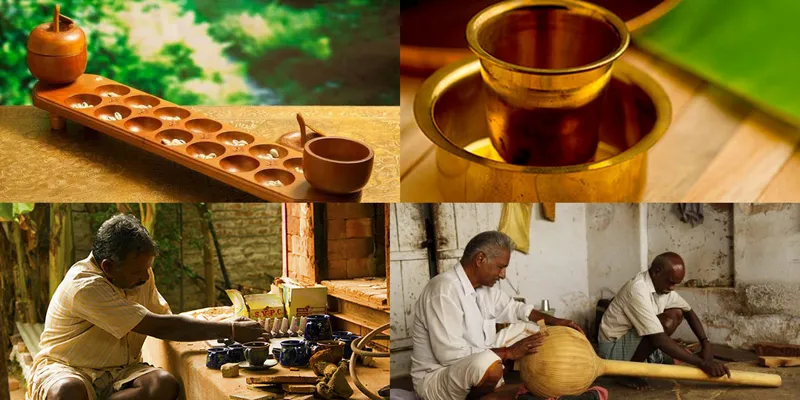Through Peacock Colours, Anusha and her team are connecting artisans with customers
Known as the Gombegala Ooru (toy town) of Karnataka, Channapatna, 65 km from Bengaluru, is renowned for its lacquered wooden toys, a craft that dates back to the times of Tipu Sultan. On a trip here in 2014, entrepreneur Anusha Anand was horrified to see street vendors selling Chinese products in the name of Channapatna toys. The incident had a deep impact on her, and her desire to promote Indian arts and crafts led to the creation of Peacock Colours.
Anusha says, “Peacock Colours bridges the digital divide existing between a discerning customer who desires craftsmanship, authenticity, and intrinsic value and an artisan who is bereft of an opportunity to showcase his talent. This, we believe, will reward the artisans with greater equity and recognition.”
Starting out as a small, women-centric venture, headquartered in Bengaluru, Peacock Colours has negotiated many hurdles in its journey of breaking even.
A bumpy start
Monika Malik, 41, a trained doctor with a keen eye for art, is Anusha’s co-founder, a partnership that came about over a casual lunch.

They registered the company in 2015, thinking they would be able to launch in three months. Extensive travel across the country, connecting with and onboarding artisans, photo shoots, cataloguing, signing vendor contracts, logistical agreements, and ensuring the regulatory requirements were well in place, proved otherwise. Anusha says,
We were ready to go live with one of the e-commerce platforms when an industry mentor pointed out that it’s much better in the long run build your own platform so you can differentiate at various levels and not just the products catalogued and sold. What was planned as a quick website development became a nightmare with massive schedule and cost overruns. I didn’t have much e-commerce knowledge so I guess I was partly to blame for not setting forth the expectations from the portal.
With vendors fretting about the delay, they finally launched in the latter half of 2015. Although they received orders from day one, they realised that the system had not been adequately user tested and that all key integrations were giving away. Anusha narrates,
We kept fixing bugs for months till mid-2016, when we could eventually rebuild the platform with all necessary automation. To be honest, we were close to giving up many times but the support and encouragement from family and friends and the hope of creating something magical with the artisans kept us going.
Focus on women
Peacock Colours has a range of products from sarees and jewellery to cast iron utensils, furniture, and handlooms.
As a managed marketplace, they verify and onboard vendors with proven quality products. They then coach them on e-commerce admin management because of their complete lack of exposure to technology. No inventory is held at their end which helps in keeping costs low and scaling manageable.
However, the initial pitch to vendors posed a major problem. Anusha says, “Those were the days when Flipkart and other big e-commerce companies had taken India by storm with most vendors wanting to be a part of them. Just being a part of those big platforms was considered halfway to being successful, not realising how competitive each of those platforms was. I remember being turned away by more than 90 percent of the vendors/artisans we approached for the above reasons. One fine day, while running through the list of a handful of vendors who had agreed to join us, I realised it’s all women entrepreneurs. We then changed the strategy and started approaching mostly women as the pitch was somehow working only with them."
The numbers count
Though the start has been bumpy, things have settled into place for the team — they now have over 9,000 products, more than 200 categories, and in excess of 100 entrepreneurs/artisans from 14 states. “We are only limited by our ability to catalogue products quickly enough. With 2,000 customers across the globe, we are confident that over the next 18 months we will be able to grow the customer base to 30,000 people across the globe.”
They have steered clear of the discount route and stayed true to their roots for an organic growth.
Marketing to motherhood
An MBA in human resources from the School of Management, Pondicherry University, 37-year-old Anusha worked as an HR professional till she quit her job and went to work at a spiritual wellness start up a centre in Bengaluru. It was while working there that her entrepreneurial drive was kindled. “I wanted to start something on my own and the drive to Channapatna was the tipping point. With support from my husband and family, I just jumped into peacockcolours.com,” she says.
Anusha looks after customer experience, marketing, and content. With twin daughters and a pet dog at home, she understands the patience and care customers need.
Words cannot describe how challenging it is. Both my daughters and of course, my pet dog, are all demanding and I feel so guilty when I can’t spare them the time I know I should. Also, my work requires me to interact with multiple stakeholders and customers wading through a stream of issues to be resolved and decisions to be taken and before I know it I have put in 12 hours a day. I hope someday, when we have made a difference to the artisans and my daughters are grown up, they will understand what kept me away.
Meanwhile, Monika looks after product curation, design, and finance. There are three other people in the team who look at cataloguing, photography, editing, website management, operations, logistics, and vendor management.
A strong and skilled team of five manages the show. According to Anusha a lean team with the required skill set helps them manage things efficiently. “After the false start, we realised quickly enough that as a team, we didn’t have enough expertise to handle the necessary functions internally and on paper, acquiring a team with all the skills looked expensive. The only way out would be if the team evolved to become multi-skilled so we can deliver most of the work internally,” shares Anusha.

Global deliveries
Since deliveries are an integral part of their business, they work with multiple logistics companies. They have API integrations with logistics providers built into their portal whereby the entire logistics process is a one-click effort. They have signed up for an export licence to facilitate international business and work with multiple logistics companies and freight forwarders (FedEx, DHL, India Post, etc.)
Tenacity and focus are the key
With all the challenges Anusha and her team have faced, tenacity and focus have held them in good stead.
Another mantra they have stuck by is, “Every customer counts but not at the cost of losing money.” Anusha says, “Most of our over 2,000 customers love us for how and what we do rather than expect us to be the cheapest in the market.”
While the focus in the coming months is on increasing the customer base and number of products, their long-term aspiration is to create the world’s largest virtual artisan village that can produce and propagate craft. Anusha says, “We have made a first firm step towards it by building connects with craft associations (1,500-plus artisans) that work with the tribal and rural populace who we will start on boarding this year and scale to over 50,000 artisans in five years.”
And as they attain the goals they have set for themselves, the one lesson they have learnt is that women from all walks of life in India are highly entrepreneurial and waiting for the opportunity to spread their wings, as is made clear by the fact that over 75 percent of their vendors are women, with only growth on the horizon.
More power to women artisans and entrepreneurs!







